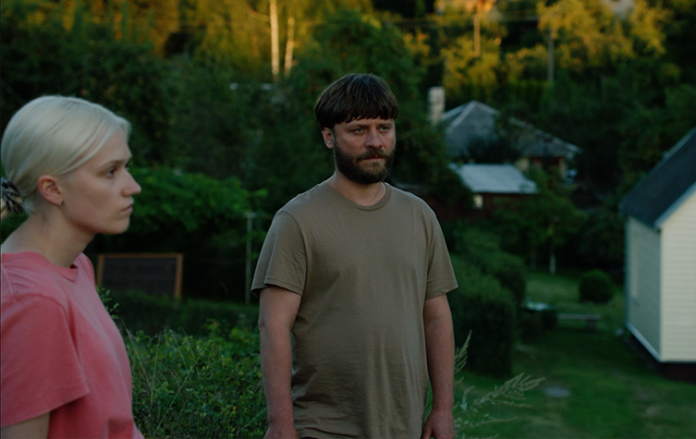This is the first full-length film by director Laurynas Bereisa, and his debut was a major success. “Pilgrims” had its world premiere at the 78th Venice Film Festival. This crime drama was first acclaimed by foreign critics and went down in Lithuanian cinema history as the country’s highest rated film. The film was also acquired by the hugely popular US film platform HBO.
The plot of the film is not complex, so it will be easy to understand for everyone. Somewhat eerie and thought-provoking, but at the same time very compelling. The location chosen for the film is a bit unusual, but important for the director – Karmelava, a town in Kaunas district. It is also important to mention that a cinema was built in Karmelava specifically for the premiere of this film. Karmelava is the birthplace of L. Bereisa, so the director’s sentimental choice is quite understandable. It is a journey through memories by two people – Paulius (Giedrius Kiela) and Indre (Gabija Bargailaite) upon their return to Karmelava, which has deeply imprinted in their memory. It is the brutal death of a loved and very dear person that forces the main characters to return to Karmelava. The death of Matas, who died four years ago and was Indre’s boyfriend and Paulius’s brother, has been extremely difficult to come to terms with, has left them devastated and with many unanswered questions. Matas was greatly tortured and murdered, which is why Paul wants to set the record straight and bring justice to the people who were involved in it.

Paulius and Indre want to explore the unknown town where someone dear to them lived, and perhaps finally achieve what they have not been able to accomplish for four years. They want to understand what Matas experienced. They are still struggling to come to terms with his death, even though it has been a long time. It is a kind of attempt to come to terms with the death of a brother and a loved one, as if to touch it one last time and let it go forever. The film is very rich in suspense, which is presented through the emotional turmoil of the characters: peacefulness, compassion, revenge, anger, through a very broad prism of emotions, yet it can evoke different sensations in the audience.
The film was positively received not only by moviegoers, but also by film critics, and won numerous awards and international recognition: at the Venice film festival, called “Horizons” (“Orizzonti”), it won the best film award, the highest award in the history of Lithuanian cinema. The best screenplay award was also given to “Pilgrims” at the Thessaloniki awards in Greece. The film also gained recognition in Lithuania, where Giedrius Kiela, who played Paulius and is one of the main actors in the film, won the best actor award at the “Kino pavasaris” festival.

Not only has the film been highly acclaimed at film festivals, but it has also been bought by HBO, the US cable TV network, a cinema platform with a line-up of the latest and most popular films, TV series, documentaries and more. Producer Klementina Remeikiene remarks on the success of the Lithuanian film: ‘We are working with “Resonate films”, who we met unexpectedly at the “Kino pavasaris” festival. We have been on the road to selling this film since then. They were very interested, they had a lot of experience with HBO. Getting the film on this home cinema platform is a really big part of their work,” says the producer of “Pilgrims” about the journey to HBO. – This is the first time a Lithuanian film has succeeded in such a big way, and it can lay the foundations for other Lithuanian films to be promoted on such platforms.”
The crime drama Pilgrims helps to change the stereotypes about the primitive nature of Lithuanian cinema. Everything presented in this film is very realistic and natural, which helps the viewer to relate to the characters and the environment in certain situations.




